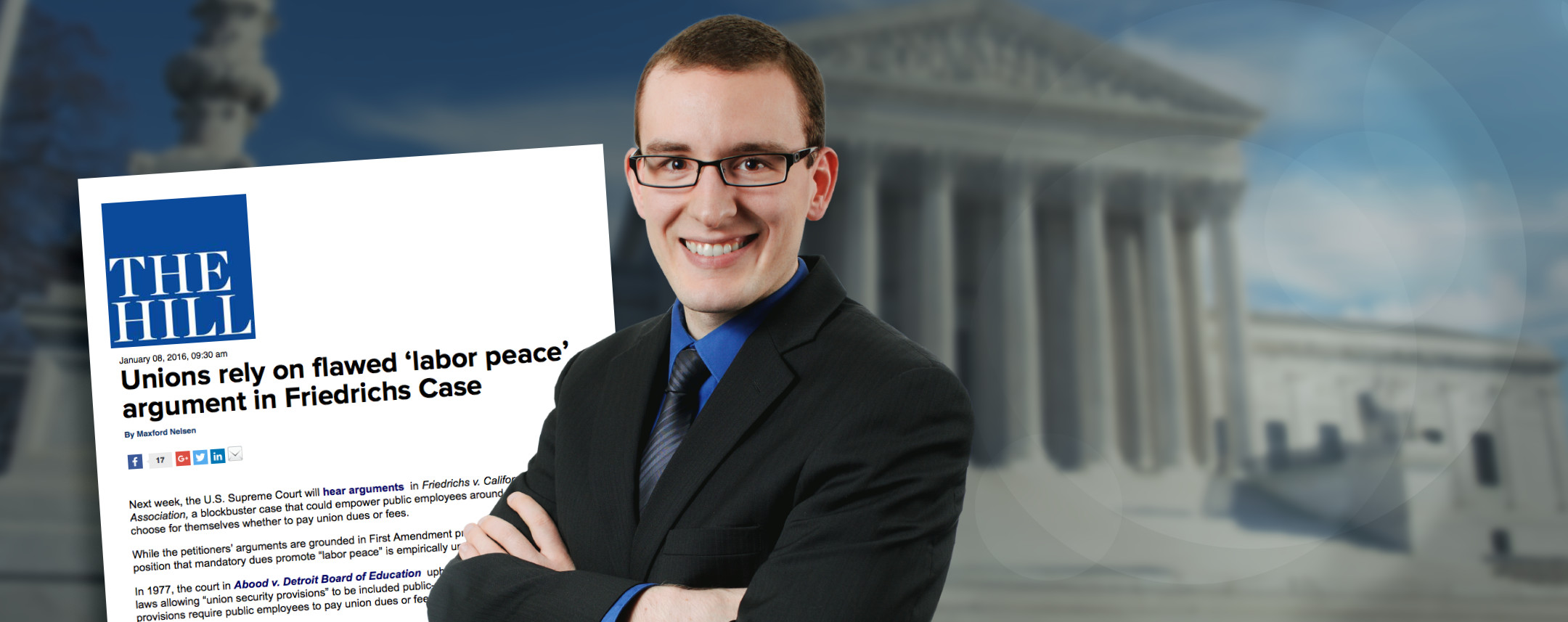Last Friday, on the eve of the U.S. Supreme Court’s hearing on Friedrichs v. California Teachers Association, The Hill newspaper published Freedom Foundation Labor Policy Director Max Nelsen’s article debunking the unions’ long standing myth that mandatory dues promotes labor “peace” — an argument the labor unions espouse as one of the reasons the Court should rule in favor of the union and against Friedrichs.
The Hill, located in Washington D.C., is one of the country’s foremost political and policy publications. Members of Congress, government officials and Supreme Court justices universally read the paper.
Unions Rely on Flawed ‘Labor Peace’ Argument in Friedrichs Case
Maxford Nelsen, January 8, 2016Next week, the U.S. Supreme Court will hear arguments in Friedrichs v. California Teachers Association, a blockbuster case that could empower public employees around the country to choose for themselves whether to pay union dues or fees.
While the petitioners’ arguments are grounded in First Amendment protections, the union’s legal position that mandatory dues promote “labor peace” is empirically unsupportable.
In 1977, the court in Abood v. Detroit Board of Education upheld the constitutionality of state laws allowing “union security provisions” to be included public-sector union contracts. Such provisions require public employees to pay union dues or fees as a condition of keeping their jobs.
While Abood allowed government employees an option to avoid supporting their union’s explicitly political activity, the petitioners in Friedrichs, a group of California public school teachers, contend the very act of collective bargaining in the public sector is political, since it directly affects the cost, size and nature of government.
Consequently, they contend any requirement for public employees to pay union dues or fees amounts to compelled political speech in violation of the First Amendment. It’s a simple and intuitive argument.
To justify this infringement of constitutional free speech protections, government unions and their political allies argue public employers have a compelling interest in agreeing to union security requirements in order to ensure labor peace.
The theory goes back to the 1960s, when public employees’ unions around the country agitated for formal collective bargaining rights by going on strike. Reasoning that the continued delivery of vital public services dictated placating the unions at any cost, many state legislatures gave in to their demands, one of which included making the payment of union dues mandatory.
But the question of whether union security promotes labor peace in public employment relations is primarily empirical, not legal. In the 25 right-to-work (RTW) states where union security provisions are currently banned, public employees cannot be forced to pay any union dues or fees against their will.
Drawing on two federal strike databases – one maintained by the Bureau of Labor Statistics (BLS) and one by the Federal Mediation and Conciliation Service (FMCS) – recent Freedom Foundation research finds that RTW states experience significantly greater labor peace than union security states.
The BLS database includes 110 public employee strikes involving more than 1,000 workers that took place between 1993 and 2014. Of these, only one occurred in a RTW state. Taking the number of public employees in RTW and non-RTW states into account indicates that government employees in non-RTW states went on strike at 26 times the rate of public employees in RTW states.
These findings are also reflected by the FMCS database, which includes 509 public employee strikes with which the FMCS was involved from 1984-2014. Of these, only eight happened in RTW states. Public-sector workers in non-RTW states went on strike at a rate nearly 17 times greater than that of their counterparts in RTW states.
Also, while the average number of striking employees was effectively the same, FMCS data indicate that strikes in non-RTW states lasted about twice as long, on average, as strikes in RTW states.
Whatever the explanation for the stark disparity, the data clearly indicate that union security requirements for public employees are associated with substantially elevated government union strike activity.
If government unions wish to justify their continued ability to compel public employees to pay union dues and fees against their will, they’ll have to come up with something better than the fallacious argument that doing so will promote labor peace.











